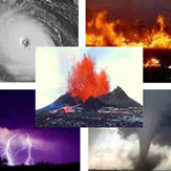
Every year the NWS' Hurricane Preparedness Week helps families get prepared and be ready for hurricane season. The Pacific hurricane season starts May 15, and the Atlantic season (for now) starts June 1.
During HPW we encourage you, your loved ones and communities in both Atlantic and Pacific hurricane-prone areas (and areas hundreds of miles inland that also get storms and flooding) to use below tips to...
- determine your personal hurricane risk;
- find out if you live in a hurricane evacuation zone;
- review/update insurance policies;
- make a list of items to replenish hurricane emergency supplies;
- and start thinking about how you will prepare your home for the coming hurricane season.
In addition to below NWS' daily suggestions for Hurricane Preparedness Week, also consider reviewing and sharing several posts here in USFRA's Disaster Preparedness forum about...
- Hurricanes 101 (hurricane basics and resources)
- Evacuation tips
-
Floods – Before, During and After
- Tornadoes 101 (tornado basics, videos and safety resources)
- Lightning Safety tips
-
Emergency Preparedness Tips for Parents of Children with Special needs
- Information and Tips about NOAA Weather Radios
And download and share a free 68-page portion of USFRA's Family Preparedness and First Aid manual with tips on how to make a family plan and kits, prepare for and respond to hurricanes, wildfires, floods and more here on USFRA.org
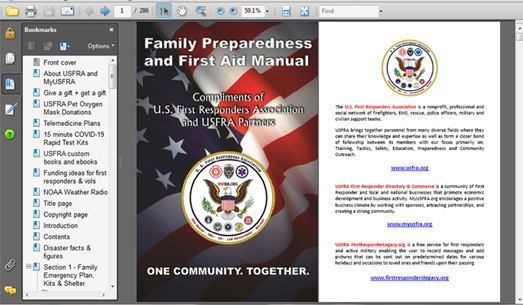
Be ready for hurricane season. Today you can determine your personal hurricane risk, find out if you live in a hurricane evacuation zone, and review/update insurance policies. You can also make a list of items to replenish hurricane emergency supplies and start thinking about how you will prepare your home for the coming hurricane season. If you live in hurricane-prone areas, you are encouraged to complete these simple preparations before hurricane season begins on June 1.
Sunday May 1: Determine Your Risk
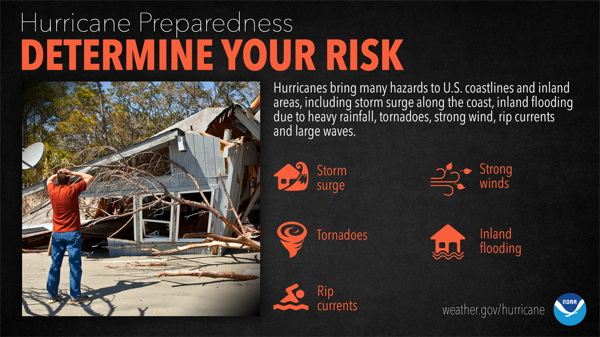
First, find out what types of wind and water hazards could happen where you live, and then start preparing how to handle them. Hurricanes are not just a coastal problem. Their impacts can be felt hundreds of miles inland, and significant impacts can occur without it being a major hurricane. Learn more at hurricanes.gov/prepare
Monday May 2: Develop an Evacuation Plan
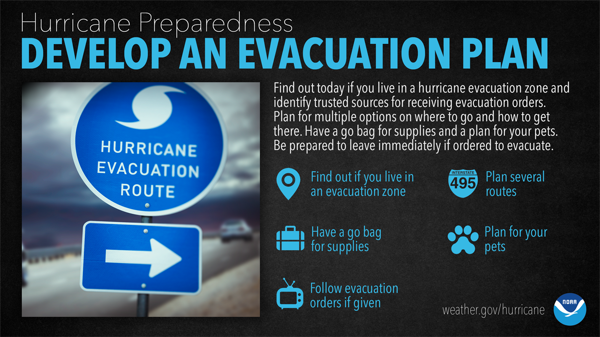
Take some time this week to make sure you have a hurricane evacuation plan. The first thing you need to do is find out if you live in a storm surge hurricane evacuation zone or if you’re in a home that would be unsafe during a hurricane. If you are, figure out where you’d go and how you’d get there if told to evacuate. You do not need to travel hundreds of miles. Identify someone, perhaps a friend or relative who doesn’t live in an evacuation zone or unsafe home, and coordinate with them to use their home as your evacuation destination. Be sure to account for your pets, as most local shelters do not permit them. Put the plan in writing for you and those you care about.
Tuesday May 3: Assemble Disaster Supplies and Kits
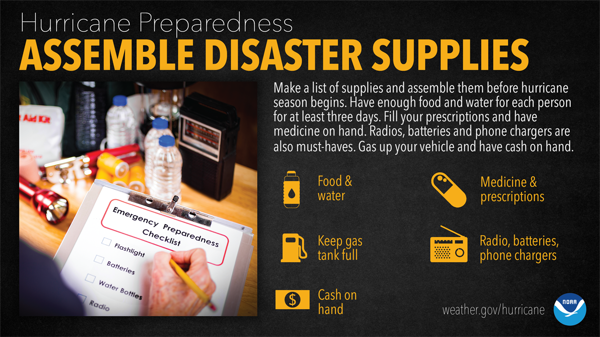
Just having enough supplies to make it through a hurricane isn’t enough. You need plenty to make it through what could be a LONG recovery period too. Water and electricity could be out for a week or more. Have enough non-perishable food, water and medicine to last each person in your family for a MINIMUM of three days (but up to 2 weeks or more is better.) Also make sure you have extra cash, a battery-powered radio, flashlights, and a portable crank or solar powered USB charger to charge your cell phone, a generator, if possible and more. Find more tips in USFRA's Family Preparedness and First Aid ebook
Wednesday May 4: Get an Insurance Checkup
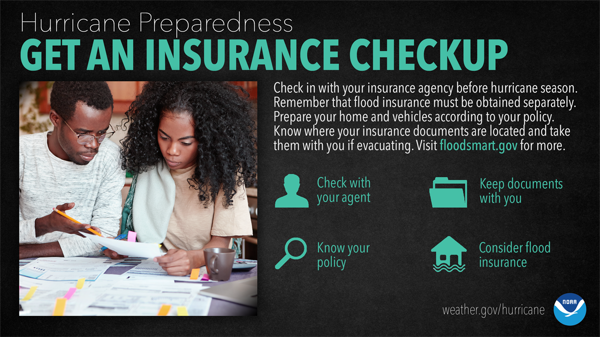
Call your insurance company or agent and ask for an insurance checkup to make sure you have enough homeowners insurance to repair or even replace your home...and remember, standard homeowners insurance doesn’t cover flooding. Whether you’re a homeowner or renter, you’ll need a separate policy for flooding. Visit floodsmart.gov and act now as flood insurance requires a 30-day waiting period.
Thursday May 5: Strengthen Your Home
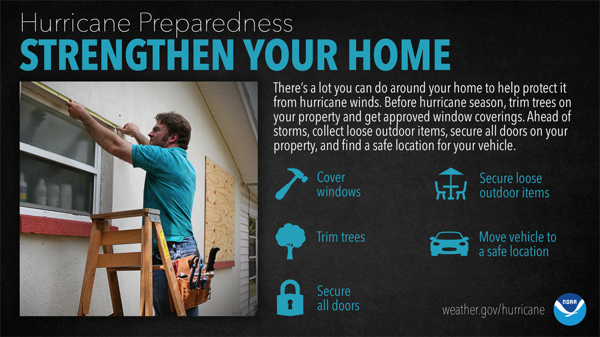
If you plan to ride out a hurricane in your home, make sure it is in good repair and up to local hurricane building code specifications. Have the proper plywood, steel or aluminum panels to board up the windows and doors. Remember, the garage door is the most vulnerable part of the home, so it must be able to withstand high winds. Learn more at flash.org/protect.php
Friday May 6: Help Your Neighbor
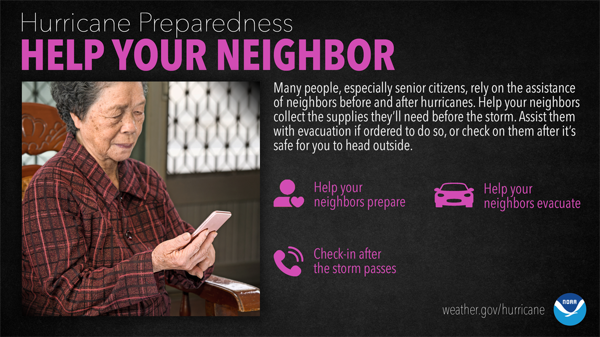
Many Americans rely on their neighbors after a disaster, but there are also many ways you can help your neighbors before a hurricane approaches. Learn about all the different actions your community can take to prepare and recover from the hazards associated with hurricanes at ready.gov/neighbors . Also download and share a free 68-page portion of USFRA's Family Preparedness and First Aid manual
Saturday May 7: Complete a Written Plan
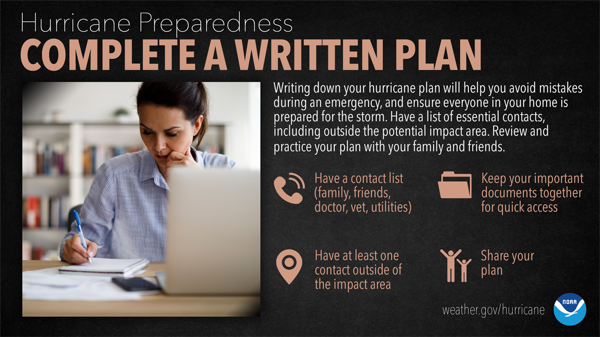
The time to prepare for a hurricane is NOW, before the season begins. Once you’re under pressure, having a written plan will take the guesswork out of what you need to do to protect you and your family. Know where you will ride out the storm and get your supplies now. You don’t want to be standing in long lines when a Hurricane Watch is issued. Those supplies that you need will probably be sold out by the time you reach the front of the line. Being prepared now will mean the difference between your being a hurricane victim and a hurricane survivor.

